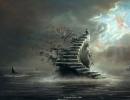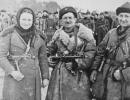“Tender is the Night,” the history of ISIS and survival skills from the intelligence services: favorite books of Disney head Robert Iger. Pulitzer Prize Winner: We Made ISIS “Black Flags: The Rise of ISIS,” Joby Warrick
As Business Insider notes, Robert Iger leads Disney at a significant time for it - during his leadership, the corporation acquired control of Marvel Studios and Lucasfilm, and the value of the company's shares quadrupled.
Iger gave an interview to Variety in which he talked about his career. The entrepreneur recalled his first job as a meteorologist and shared his history of working in the media. At the end of the interview, the Disney CEO presented a list of seven of his favorite books that he recommends every professional read.
1. Black Flags: The Rise of ISIS by Joby Warrick
Warrick's book on ISIS won the 2016 Pulitzer Prize. The author tells how the ISIS ideology originated in one of the Jordanian prisons and how two US presidents unwittingly helped spread it.
Warrick was able to interview CIA officials and gain access to documents from Jordan and track how diplomats, spies, generals and heads of state tried to stop the spread of the movement - some saw it as a greater threat than al-Qaeda. Critics call the book "brilliant and complete."
2. The Wright Brothers, David McCullough
A book from two-time Pulitzer Prize winner David McCullough about the lives of the inventors of the first airplane, Wilbur and Orville Wright.
3. “Born to Run,” Bruce Springsteen
American performer Bruce Springsteen dedicated seven years of his life to this book. In the work, Springsteen told the story of his life - "with his characteristic humor and originality."
4. Tenth of December: Stories by George Saunders
According to readers of the book, the story reveals questions of modern human morality. The author tries to find out what makes any person good in the eyes of others and what makes him humane.
5. “Between the World and Me,” Ta-Nehisi Coates
6. Secret Service Survival: 100 Key Skills, Clint Emerson
A practical survival guide from retired US Navy man Clint Emerson, adapted for those outside the military. The book includes instructions on self-defense, getting rid of surveillance or stalkers, and surviving in other dangerous situations.
7. Tender is the Night, Francis Scott Fitzgerald
A classic novel from American writer Francis Scott Fitzgerald, published in 1934. The life story of a talented psychiatrist and his wife, whose wealth pushes them to death.
The West went to war to end terror. Instead, we conjured a man who later founded the Islamic State (a terrorist organization banned in the Russian Federation - editor's note). This is described in a new book by journalist Joby Warrick.
The Americans miscalculated.
It was 2004, approaching the second year of the intervention in Iraq, and gradually it became clear to the American government what they were up against.
Or more precisely: with whom.
In the shadow of the overthrow of the Baath regime of dictator Saddam Hussein, a tattooed ex-convict from an obscure Jordanian mining town led a rebellion against Iraq's majority Shiite Muslims. An insurgency of unprecedented brutality—even for violent extremists. The destruction of holy sites and disdain for civilian lives went hand in hand: mosques and historical shrines of Shia Muslims were destroyed, and markets in Shiite cities were turned into the sites of bloody suicide attacks.
Soon the man behind the ethnic cleansing would become known throughout the world as Abu Musab al-Zarqawi. He rose from the ashes of a destructive invasion and lit a sectarian fire in civil war, which he later turned into the foundation of a movement that, after many mutations, was to become ISIS.
What's worse is that the West itself made this possible. When it became clear in 2004 that Zarqawi was going to bury the American plans, the US State Department published a poster with a pair of photographs of the Jordanian taken after his arrest and promised a $25 million reward. Zarqawi was identified as the mysterious mastermind behind the religious resistance movement in Iraq, with the goal of the Americans being to encourage locals to inform authorities where he was hiding. But instead, the poster and the rumors that arose around it turned Zarqawi into a cult figure among jihadists. Militant Islamists around the world - including in Denmark - joined his fight in Iraq. The myth of the invisible leader gave Zarqawi incredible popularity. Jihadists even used the American poster in their own propaganda.
Context
How to save the Middle East after the departure of ISIS?
Le Figaro 03.11.2016Who will defeat ISIS?
Haqqin.az 10/31/2016The war with ISIS on the Mosul-Aleppo line
Star gazete 10/19/2016Political Islam after ISIS
As Safir 04.10.2016The story that unfolds in the book Black Flag, published in Danish on Wednesday, is quite symptomatic of the misunderstanding of the roots of militant Islamism. Because with Zarqawi, the West itself participated in the creation of a monster that today, many years later, is still bombing its way through crowds of people in the Middle East, crowds of passengers at Brussels airports and concert hall spectators in Paris.
Journalist Washington Post Joby Warrick spent a good two years combing through classified documents and interviewing a variety of people, from American agents to members of Iraq's Mukhabarat security service. We meet young CIA operative Nada Bakos, who becomes the intelligence agency's foremost expert on Zarqawi. We meet the smart doctor Basel al-Sabha, who treated Zarqawi while the Jordanian was in prison. And we meet Abu Haytham, the head of the Jordanian Counterterrorism Corps, whose mission is to destroy ISIS.
It is through these images that we formulate a portrait of the world-famous jihadist, and it is through them that we get an explanation of how a simple Jordanian prisoner - in the eyes of the West - was able, in the end, to create what we know today as the Islamic State (ISIS).
"I've been fascinated by Zarqawi for years," says Warrick, who earlier this year won journalism's top prize, the Pulitzer Prize, for the book.
“He is a figure no less significant than Osama bin Laden in terms of the development of global jihad. But we in the West do not understand who he was and what he created. And I’m afraid that we still underestimate him today.”
From gigolo to superstar
Warrick's conclusion from his analysis is that ISIS emerged long before the movement conquered large areas in its landmark blitzkrieg in the spring of 2014, occupied the major Iraqi city of Mosul and declared the creation of a caliphate. This was due to the marginalization and oppression that Sunnis in Iraq and Islamists in Syria were subjected to by their respective governments. The root of the problem - marginalization and oppression - meant that Zarqawi was then able to gain support and recruit his own infantry. Subsequently, ISIS continued to profit from the same marginalization, and tomorrow, when ISIS is driven out, a new militant movement may do so again. Because Sunni Muslims always feel marginalized by the Shiite - and Western-backed - government in Baghdad.
“If I try to extract a simple core idea from my work on the book, it would be this: the United States and the West have incorrectly analyzed what was happening in foreign policy. It was as if it came as a complete surprise to us that we, too, were involved in the success of Zarqawi’s project. We are just as amazed by ISIS today, so it is important to remember history,” the writer says.
Abu Musab al-Zarqawi was born in the city of Zarga in 1966 into a poor Jordanian-Palestinian family of Bedouin origin, he grew up in the city of Zarga, as a young man he could not find his place in life and was often at odds with the law . He drank like a maniac, had tattoos and was known to local police as a pusher, burglar and gigolo.
He found consolation in the extreme, militant branch of Islamism. He got clean, had a relative cut off his tattoos with a razor blade, and ended his habitual criminal past. Instead, he went to Afghanistan in 1989 to join the mujahideen's fight against the Soviet occupation authorities. This marked the beginning of Zarqawi's career as an Islamist guerrilla leader.
“Zarqawi was an atypical role model for Islamists. He was not like the strategist Osama bin Laden or the smart and refined Mohammed Atta (“the brains” of the September 11 attacks - editor's note). Zarqawi was from another planet. Completely different type. He dressed up in black clothes, fired a machine gun into the air and executed his prisoners himself. It’s simply incomprehensible how he could later become like this important bird" says Joby Warrick.
In fact, Zarqawi joined the rebels in Afghanistan too late. But the Jordanian continued to make his way into the ranks of militant Islamists and was eventually arrested in Jordan and thrown into the notorious al-Swaqa prison. His time behind bars made Zarqawi even more radical, and when King Abdullah of Jordan took over after his father in 1999, he released some political prisoners so that the transition could take place without special problems, he had no idea that he was indirectly participating in the revival of militant Islamism.
For ISIS, myth has become a trump card
Yet this is exactly what happened, says Joby Warrick in his book. The American occupation of Iraq gave Zarqawi's fundamentalism a foundation on which to stand, and since then the Jordanian has been behind everything from bombings and kidnappings to the execution of hostages such as American businessman Nick Berg. Zarqawi himself cut off Berg's head, the gruesome execution was filmed and posted on the Internet - this became a propaganda maneuver that ISIS began to resort to many years later.
Like-minded people looked at Zarqawi as a resistance hero fighting the occupation authorities. And when his then organization, the Army of Monotheism and Jihad (Jama'at al-Tawhid wal-Jihad), later allowed itself to be absorbed by al-Qaeda, Zarqawi was crowned "emir" of the Iraqi branch - the harbinger of the ISIS movement.
The Jordanian died during an American bombing in 2006, but then everything bad - if you look at it through Western eyes - had already happened. The question is, how did a street urchin with such a tarnished reputation, such limited knowledge of religion, and a man from such an unattractive background manage to rise to the top and lay the foundations of what is now seen as one of the biggest security threats in the world?
“It surprises me too,” Warrick admits.
But perhaps the explanation for Zarqawi's success lies precisely in the fact that he was the antithesis of the jihadist leader, the writer reflects.
“I think... Before he became a jihadist, Zarqawi was a gangster. People who were attracted to his wrestling were attracted to his swagger and gangster ways. First of all, criminal elements joined him. And they gave Zarqawi power, made him a leader.”
“While I was writing Black Flag, a new generation continued the fight in Syria. It seems to me that Zarqawi was successful because his enemies exaggerated his personal importance, elevating him and making him more important than his own movement. It's your own fault. Thus, we can say that we ourselves created Zarqawi, turning him into such a mythical figure.”
In this regard, it can be noted that the West, by turning Zarqawi into a myth, itself endowed the global jihadist movement with a PR strategy from which ISIS and the ghostly “caliph” Abu Bakr al-Baghdadi subsequently made considerable capital.
“ISIS later adopted the image of this jihadist man of action and uses it now in their propaganda for all their soldiers,” Warrick says.
"It's worth thinking about."
American journalist Joby Warrick's book Black Flags: The Rise of ISIS received the Pulitzer Prize for the best work of non-fiction in 2016. (ISIS is a terrorist organization banned in Russia - Ed.). This decision was announced on Monday, April 18, in New York, at Columbia University.
Joby Warrick has worked for The Washington Post since 1996, where he writes about the Middle East, diplomacy and national security. In 2003, the International Press Club of America awarded him for best materials about the threat of nuclear weapons proliferation. In Black Flags, Warrick reveals how the "strategic mistakes" of two US presidents - George W. Bush and Barack Obama - helped strengthen ISIS.
The best a work of art The book "The Sympathizer" is recognized. Its author is an American scientist of Vietnamese origin, Viet Tan Nguyen. He researches and teaches at the University of Southern California American and English literature, and also does ethnography. "The Sympathizer" is the debut novel of this author, dedicated to the Vietnam War. Main character- a spy infiltrated into the army of South Vietnam - in 1975, together with its remnants, he goes to Los Angeles, where he begins a double game and life with double consciousness.
Armenian-American Peter Balakian was recognized as the best poet of 2016. In the collection “Ozone Diary,” he starts from memories of 2009, when, together with a team of television journalists, he dug up the remains of victims of the Armenian genocide in the Syrian desert.
The best biography was awarded to William Finnegan, who in his book “Barbarian Days” talks about his own passion for surfing.
For the best dramatic work(Broadway musical "Hamilton") awarded to composer, poet and actor Lin Manuel Miranda.
The best biographical work was awarded to the biography of the American cavalry officer George Custer by T. J. Stiles. This writer specializes in biographies and previously won a Pulitzer for a book about Cornelius Vanderbilt, America's richest 19th-century entrepreneur.
The AssociatedPress agency won the Pulitzer's top journalism award, “For Service to the Public,” in 2016. Reporters from TheNewYorkTimes, TheBostonGlobe and other publications also received awards.
Let us remind you that the Pulitzer Prize has been awarded annually since 1917 for achievements in the field of literature and journalism. Its size is 10 thousand dollars. The money is paid from the newspaper magnate's fund late XIX- the beginning of the 20th century, one of the fathers of yellow journalism, Joseph Pulitzer.
Elena Kuznetsova, Fontanka.ru
Disney CEO Robert Iger's favorite books, which he shared in an interview with Variety...
As Business Insider notes, Robert Iger leads Disney at a significant time for it - during his leadership, the corporation acquired control of Marvel Studios and Lucasfilm, and the value of the company's shares quadrupled.
Iger gave an interview to Variety in which he talked about his career. The entrepreneur recalled his first job as a meteorologist and shared his history of working in the media. At the end of the interview, the Disney CEO presented a list of seven of his favorite books that he recommends every professional read.
1. Black Flags: The Rise of ISIS by Joby Warrick
Warrick's book about the terrorist organization ISIS won the 2016 Pulitzer Prize. The author tells how the ISIS ideology originated in one of the Jordanian prisons and how two US presidents unwittingly helped spread it.
Warrick was able to interview CIA officials and gain access to documents from Jordan and track how diplomats, spies, generals and heads of state tried to stop the spread of the movement - some saw it as a greater threat than al-Qaeda. Critics call the book "brilliant and complete."
2. The Wright Brothers, David McCullough
A book from two-time Pulitzer Prize winner David McCullough about the lives of the inventors of the first airplane, Wilbur and Orville Wright.
3. “Born to Run,” Bruce Springsteen

American performer Bruce Springsteen dedicated seven years of his life to this book. In the work, Springsteen told the story of his life - "with his characteristic humor and originality."
4. Tenth of December: Stories by George Saunders

According to readers of the book, the story reveals questions of modern human morality. The author tries to find out what makes any person good in the eyes of others and what makes him humane.
5. “Between the World and Me,” Ta-Nehisi Coates

6. Secret Service Survival: 100 Key Skills, Clint Emerson

A practical survival guide from retired US Navy man Clint Emerson, adapted for those outside the military. The book includes instructions on self-defense, getting rid of surveillance or stalkers, and surviving in other dangerous situations.






